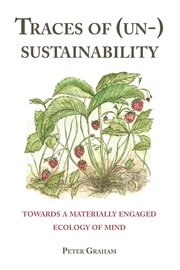-
Zusatztext
-
Persons only develop in relation to environment, much in the same way we develop psychologically in relation to our parents and caregivers. Neither child nor parent is properly conceptualized, modelled, or understood without the inclusion of the other in the map or model of psychological/ecological development. Likewise, we perceive, think, and feel with and not just about environment and material artifacts. The achievement of sustainability then implies making changes to minds that are mediated, extended and distributed across brains, bodies, and the materiality of ones environment. Our inherited world, however broken, guides our individual and collective becoming much as a parent guides the development of a child. The traces of (un-) sustainability perspective refutes the economistic conceptual model whereby rational economic actors are misperceived and misunderstood to have the moral right, if not the duty, to actively participate in the destruction of our collective future with ethical immunity. The presumed intelligence and naturalness of the market-based economic system is exposed as primarily a historically inherited culture-based delusion. If values and attitudes can be at least partially transformed by transforming the mundane materiality which is co-constitutive of our social mind, then an important milestone will have been achieved in our understanding of (un-) sustainability.
-
-
Kurztext
-
The traces of (un-) sustainability perspective refutes the economistic conceptual model whereby rational economic actors are misperceived and misunderstood to have the moral right, if not the duty, to actively participate in the destruction of our collective future with ethical immunity.
-
-
Autorenportrait
- Peter Graham earned his Ph.D. at the Queen's University School of Environmental Studies in Kingston, Ontario, Canada. He also holds master's degrees in educational studies and interdisciplinary social sciences as well as a graduate diploma in community economic development from Concordia University in Montreal, Quebec. Dr. Graham currently teaches courses on sustainability related subjects at Concordia University.
Detailansicht
Traces of (Un-) Sustainability
Towards a Materially Engaged Ecology of Mind
ISBN/EAN: 9781433176661
Umbreit-Nr.: 9328598
Sprache:
Englisch
Umfang: 282 S., 5 farbige Illustr.
Format in cm: 2 x 23.1 x 15.5
Einband:
gebundenes Buch
Erschienen am 31.07.2020
Auflage: 1/2020


